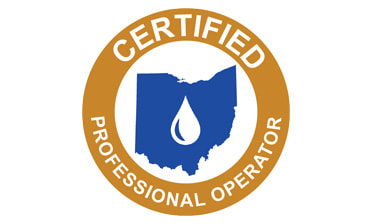Guide to Becoming a Certified Water or Wastewater Operator in Ohio
It is extremely important that people receive safe drinking water, and that wastewater is treated and discharged in an environmentally safe manner. Water and wastewater operators are certified by the Ohio Environmental Protection Agency (Ohio EPA). There are minimum educational and experience requirements depending on the level of certification desired. All levels require a high school diploma or equivalent, on-the-job experience, and continuing education. First, let's understand the levels of certification. Click here to read Operator Certifications Required Training.
Disclaimer: The information provided on this webpage is for guidance purposes only. It is essential to consult official sources and regulations for the most accurate and updated requirements.
What Are the Levels of Certification?
Ohio offers five certification levels: Class A, Class I, Class II, Class III, Class IV and a non-certification level called OIT or Operator-In-Training. Each level corresponds to specific responsibilities and competencies.
Class A
Class A certification is entry level and requires a high school diploma or GED along with 1,040 hours of experience OR 3 years of working experience, while higher levels demand more experience, education, and demonstrated proficiency.
Class I
Class I requires a high school diploma or the equivalent and must have 12 months of operating experience.
Class II
Class II requires a high school diploma or the equivalent and must have 36 months of operating experience.
Class III
Class III requires a high school diploma or the equivalent and must have 60 months, including 12 months as a Class II operator.
Class Iv
Class IV requires a high school diploma or the equivalent and must have 36 months as a Class III, 24 months management experience at a Class III or IV facility.
Operator-In-training
Operator's-In-Training requires a high school diploma or the equivalent and has no required hours.
What is the Step-By-Step Certification Process?
- Review eligibility criteria here to determine whether you may sit for the desired classification exam.
- If you meet the requirements for eligibility, click here to start registering for your examination. Select categories that apply to your registration.
- During your registration process you will be required to verify your eligibility and intent for application in the Ohio EPA certification and will be subject to an examination fee.
- Once your application is approved, you will be eligible to take the certification exam.
- Study the recommended resources and take the exam at an authorized testing center.
- Once you have passed the exam you must submit your application results to apply for Ohio's EPA Operators Certificate.
- For help uploading exam application results click here "Apply for certification after passing a third-party examination" to download an instructional pdf. Click here for more exam information.
What is the Step-By-Step process of becoming an Operator-In-Training?
- The first step is to have an understanding of the Wastewater/Water systems. If you have enough education and knowledge, you may be approved to take one or more of the certifications exams. Click here to start registering.
- Once you have been approved for the examination, pass it, create an Ebiz account and apply to "Operator-In-Training." Use this informational video to help you create your account.
- From the day you pass your exam and are approved to be an Operator-In-Training you will have four years to complete the required experience based on your desired certification.
- Upon completion of required experience, you can submit an application to become certified as a professional Operator in the classification you applied for (you are limited to class A, I, II examinations).
What additional information should I know?
- To find a testing center near you use Testing Excellence.
- Some expected equations to know. Click Water Supply and Distribution System Formulas and Wastewater Treatment and Collection System Formulas
- Click here for exam review sheets/exam review guides.
Why Certification Matters?
- Obtaining proper certification is essential for compliance with Ohio regulations and maintaining safe drinking water and efficient wastewater treatment.
- Certification demonstrates your expertise and dedication to the profession, opening up various career opportunities within the industry.
- Operating any water and wastewater system requires a certified license.
What Do I Need to Complete for Continuing Education and Professional Development?

As a certified operator, you must fulfill continuing education requirements to maintain your certification. The Ohio Rural Water Association and other organizations offer various opportunities for professional development, including:
- Workshops, seminars, and webinars on industry topics and emerging technologies.
- Conferences and networking events that provide insights, knowledge sharing, and the chance to connect with industry experts.
- Continuing education courses that help you stay updated on regulatory changes, best practices, and new advancements in the field.
Resources and Support
Networking and Support
Connect with industry professionals and seek guidance through networking and support systems, including:
- Ohio Rural Water Association Membership: Become a member of ORWA to access a community of water professionals and industry-specific resources. Click here to learn more about ORWA Membership.
- Online forums and communities: Participate in online platforms, such as the Ohio Water Operator Forum, where you can connect with experienced operators, ask questions, and share insights.
Education and Training Programs
Explore accredited institutions and organizations that offer relevant courses and training programs for water and wastewater operators in Ohio. Some recommended resources include:
- Ohio Rural Water Association (ORWA): ORWA offers training programs, workshops, and webinars tailored to the needs of operators at different certification levels. Click here for more information on ORWA training programs, workshops and webinars.
Frequently Asked Questions
How long does it take to become certified?
The time it takes to become certified depends on the specific classification you want and experience you have. Refer the beginning of this page "Understanding Levels of Certification."
What are the education and experience requirements for each certification level?
All certifications require at least a high school diploma or a GED and require different acquired experience. This can be shown at the beginning of this page labeled "Understanding Levels of Certifications."
How often do I need to renew my certification?
Wastewater/Water Operators in Ohio must complete 8 to 24 hours of continuing education by December 31st every two years, depending on the license type. At least half of those hours must be directly related to Operations and Maintenance (O&M).
Are there any exemptions or reciprocity agreements for out-of-state operators?
In Ohio there is a reciprocity agreement between the following states: Indiana, Kentucky, Michigan, Pennsylvania, or West Virginia.
Wastewater/Water Operator Job Growth Forecast

- Vacancies for this career have increased by 29.58 percent nationwide, with an average growth of 1.85 percent per year. Demand for Water and Wastewater Treatment Plant Systems Operators is expected to go up, with an expected 1630 new jobs filled by 2029.
What will my salary be?
A Wastewater/Water Operator's salary depends on where you work and your certification level. In Ohio the average salary you can expect as an operator is between $31,543 to $52,493.
Glossary of Key Terms
For industry-specific terms, acronyms, and definitions click here for an online source. Click here for a downloadable PDF.
Expand Your Knowledge!
Here at Ohio Rural Water Association, we know that finding your passion is often a long but rewarding journey. Our informational guide for the Wastewater/Water Operator Industry will offer you a general understanding of the process to get started, important terminology, resources and support, among other informative additions. We hope that this will help you along your journey and hope to see you at one of our future Trainings and/or Events!


